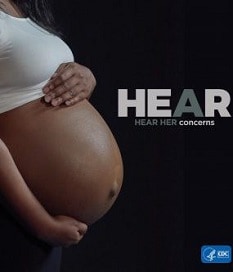CDC Activities
Learn about depression among women and CDC activities to address this important health topic.
Depression Among Women
Depression is a common and serious illness, affecting 1 out of 10 women aged 18-44 years. An estimated 3 in 10 women with depression are also affected by anxiety. Additionally, substance use is more likely amongst women with depression or anxiety compared to those without these conditions.
Depression during and after pregnancy can result in negative outcomes for pregnant and postpartum people and their babies. Professional and clinical organizations recommend that all adults, including pregnant and postpartum people, be screened for depression.
However, a recent CDC study shows that health care providers are missing opportunities to ask pregnant and postpartum people about depression. About 1 in 5 pregnant people were not asked about symptoms of depression during a prenatal visit, and 1 in 8 people were not asked during a postpartum visit.
CDC Activities

CDC’s Division of Reproductive Health (DRH) works to improve the mental health of women through collaboration with professional organizations and research.
The Division assisted the American College of Obstetricians and Gynecologists and other professional organizations with the development of a Perinatal Mental Health Toolkit for health care providers treating individuals during and after pregnancy (e.g., obstetrician-gynecologists). The toolkit summarizes common mood and anxiety disorders, provide guidance for women’s health care providers to discuss mental health with patients and recommendations for screening frequency and administration, and include education resources for patients, families, and providers. This collaboration also led to the development and dissemination of professional education trainings and webinars on the treatment of mental health conditions in women.
Additionally, to improve the integration of mental health in primary health care, DRH collaborated with the American Academy of Pediatrics to identify and share highlights about existing primary care practices that successfully model the implementation of mental health and social support screening and resource connection for parents and their infants. Videos, conversation starters, and job aids are available to help guide patients and providers through conversations related to mental health.
DRH is also supporting the American Psychiatric Association with efforts to improve the continuity of care for pregnant and postpartum people with mental health and substance use conditions. Mental health providers and pregnant and postpartum people will share experiences, barriers, and needs related to mental health care. Findings will help guide the development of a toolkit for patient-centered mental health care for pregnant and postpartum people.
Hear Her

The Hear Her campaign supports CDC’s efforts to prevent pregnancy-related deaths by sharing potentially life-saving messages about urgent warning signs, including ones related to mental health conditions.
Research Activities
CDC/DRH funded a study that aimed to improve, evaluate, and deliver a low-cost and sustainable program to address depression during and after pregnancy. This randomized control trial was conducted by the University of Massachusetts at Worcester. The control group was enhanced usual care (consultation and care coordination) through access to the Massachusetts Child Psychiatry Access Project (MCPAP) for Moms. The intervention group, Program in Support of Moms (PRISM), was designed to help obstetric and gynecology practices address the significant public health issue of depression during and after pregnancy. PRISM aimed to close gaps in health care delivery to ensure that women with depression during and after pregnancy receive the best treatment, which can result in improvement in their symptoms.
Additionally, CDC’s DRH analyzes data from the Pregnancy Risk Assessment Monitoring System, the Behavioral Risk Factor Surveillance System, the National Survey Drug Use and Health, the MarketScan® Research Database, IQVIA database, and other sources to provide national and state-level surveillance about the prevalence of and risk factors for depression, as well as related health conditions, pregnancy outcomes, and diagnosis and treatment of depression. DRH also assists states and nongovernmental organizations to perform similar activities and to develop public health strategies for addressing mental health conditions among women.
The Health Resources & Services Administrations Maternal and Child Health Bureau program (HRSA MCHB) is another federal organization that works with national, state, and community organizations and academic institutions to improve public health. For information on HRSA MCHB’s program to help address maternal mental health conditions that often affect women during and after pregnancy, see Screening and Treatment for Maternal Depression and Related Behavioral Disorders Program (MDRBD).
Selected Publications List
- Association of Mental Health Conditions, Recent Stressful Life Events, and Adverse Childhood Experiences with Postpartum Substance Use – Seven States, 2019-2020.
- A Systematic Review and Meta-analysis of Parental Depression, Antidepressant Usage, Antisocial Personality Disorder, and Stress and Anxiety as Risk Factors for Attention-Deficit/Hyperactivity Disorder (ADHD) in Children.
- Healthcare Utilization and Costs Associated With Perinatal Depression Among Medicaid Enrollees.
- Prevalence of Bipolar Disorder in Perinatal Women: A Systematic Review and Meta-Analysis.
- Healthcare Utilization and Costs Associated With Perinatal Depression Among Medicaid Enrollees.
- Development of the Practice Readiness to Evaluate and address Perinatal Depression (PREPD) assessment.
- Postpartum Depressive Symptoms and Screening Opportunities at Health Care Encounters.
- Current Marijuana Use Among Women of Reproductive Age.
- Vital Signs: Postpartum Depressive Symptoms and Provider Discussions About Perinatal Depression – United States, 2018.
- Impact of the COVID-19 Pandemic on Mental Health, Access to Care, and Health Disparities in the Perinatal Period.
- Preventing Pregnancy-Related Mental Health Deaths: Insights From 14 US Maternal Mortality Review Committees, 2008-17.
- Addressing Perinatal Mental Health and Opportunities for Public Health.
- Recorded Diagnoses of Depression During Delivery Hospitalizations in the United States, 2000–2015.
- Treatment of Substance Use Disorders Among Women of Reproductive Age by Depression and Anxiety Disorder Status, 2008-2014.
- The PRogram In Support of Moms (PRISM): study protocol for a cluster randomized controlled trial of two active interventions addressing perinatal depression in obstetric settings.
- Trends in Selected Chronic Conditions and Related Risk Factors Among Women of Reproductive Age: Behavioral Risk Factor Surveillance System, 2011-2017.
- Marijuana use during and after pregnancy and association of prenatal use on birth outcomes: A population-based study.
- Preconception Health Indicators for Public Health Surveillance.
- Disparities in Preconception Health Indicators – Behavioral Risk Factor Surveillance System, 2013-2015, and Pregnancy Risk Assessment Monitoring System, 2013-2014.
- Prevalence and maternal characteristics associated with receipt of prenatal care provider counseling about medications safe to take during pregnancy.